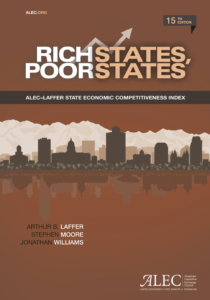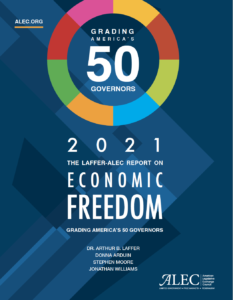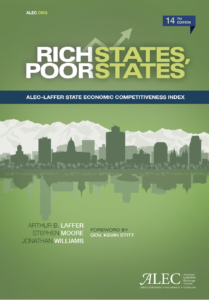Tax Reform
Key Points
- A vibrant, growing economy allows businesses and households to flourish.
- A state’s economic vitality starts with a principled tax code that is fair, transparent and competitive relative to other states.
- Over the past decade, the nine states without a personal income tax have consistently outperformed the nine states with the highest taxes on personal income – in job creation, population growth and even tax revenues.
- With the right set of policies in place, lower-tax states can attract much-needed human and financial capital from higher-tax states that penalize wealth creation.
Mainstream economists, small business owners and taxpayers across the country understand that growth-oriented reforms mean increased opportunity for all. As demonstrated by the annual Rich States, Poor States: ALEC-Laffer State Economic Competitiveness Index, sound tax and fiscal policies are critical to economic health, allowing businesses and households to flourish.
A dynamic state economy starts with a principled tax code. As noted in the ALEC Principles of Taxation, state tax codes should be fair, transparent and economically neutral. Low, competitive tax rates on a broad tax base offer a level playing field to all. In this environment, more residents will benefit from greater economic growth.
The advantages of a low-tax environment are clear. Over the past decade, the nine states without a personal income tax have consistently outperformed the nine states with the highest taxes on personal income. Similarly, those states with no income tax saw their population rise 109 percent faster than their high-tax counterparts. In those same ten years, job growth in states with no income tax increased 130 percent faster versus the states with the highest income taxes. Even state and local tax revenues in the nine states without income taxes grew 51 percent faster. While other factors have surely played a role, these general trends held true decade after decade for the past half-century.
As the research overwhelmingly shows, competitive tax and fiscal policies are vital to a state’s future. With the right set of policies in place, lower-tax states can attract much-needed human and financial capital from higher-tax states that penalize wealth creation.
Model Policies
-
Taxpayer Transparency Act Final
Be it enacted by the Legislature of the [COUNTY] as follows: Section I. [Chapter] of the Code of [COUNTY] is hereby added as provided hereinafter: TAXPAYER TRANSPARENCY 1 Title. 2 Legislative intent. 3 Definitions. 4 Searchable budget database website created. 5 Updates. 6 Compliance with Act. 7 Electronic public access…
-
Local Taxpayer Protection Act Final
Be it enacted by the Legislature of [COUNTY] as follows: Section 1. Local Taxpayer Protection Act. (A) Should the annual operating budget result in an increase in property tax levy, adoption by the Legislature shall require a vote of two-thirds of the total Legislature. (B) The…
-
Taxpayer Receipt Act Final
SECTION 1. DEFINITIONS “Department” means the Department of Management and Budget, Department of Revenue, or the Office of State Policy and Budget (depending on the state). “Major state taxes” means income, sales, alcohol, tobacco, and motor vehicle fuels tax. SECTION 2. TAXPAYER RECEIPT. (a) The department shall develop…
-
A Next-Generation Tax and Expenditure Limitation Act Final
A Next-Generation Tax and Expenditure Limitation Act Short Title: Responsible Budgeting Act. Section 1. Structural Balance (a) Sense of the Legislature: Stewarding taxpayers’ funds requires a close connection between spending and revenue. Structural balance provides this link over the medium term instead of each year to provide policy…
-
Protecting Religious Homeschooling Act Final
Section 1. Religious Property Tax Exemption A property tax exemption based on religious purposes includes real property owned by a church which allows its premises to be used by an entity if such entity is not required to make rental payments to the church, is not required to execute a…
-
Statement of Principles on State Taxation of Digital Advertising and Data Usage Final
Statement of Principles Opposition to Discriminatory Tax Treatment Well-crafted tax policy should not favor one form of commerce over another. Policies that target digital goods and services for taxation that their traditional counterparts do not face arbitrarily favor the latter, creating a competitive imbalance. Tax policy should be carefully structured…
Press Releases
-
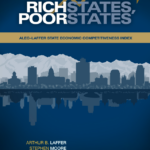
New 50-State Rankings Showcase Economic Policies Attracting Individuals and Job Creators
ARLINGTON, Va. – Today, the American Legislative Exchange Council (ALEC) released the 16th edition of Rich States, Poor States: ALEC-Laffer State Economic Competitiveness Index, the annual report assessing each…
-

ALEC Chief Economist: Inflation Reduction Act is Economic Malpractice
Arlington, Va. (August 17, 2022) – The Chief Economist for the American Legislative Exchange Council (ALEC), Jonathan Williams, issued the following statement in reaction to the signing of the Inflation…
-

Latest Big Government Spending Bill Threatens Continued Inflation
Misnamed ‘Inflation Reduction Act’ Doubles Down on Inflationary Policies Arlington, Va. – In response to today’s report from the Labor Department that the…
-
New 2021 State Economic Competitiveness Rankings Reveal the Success Formula for Prosperity After COVID-19
FOR IMMEDIATE RELEASE Contact: Alexis Jarrett Email: ajarrett@alec.org New 2021 State Economic Competitiveness Rankings Reveal the Success Formula for Prosperity After COVID-19 Utah…
-
Six States Lead the Way in Easing Tax Burdens
FOR IMMEDIATE RELEASE Contact: Alexis Jarrett Email: ajarrett@alec.org Six States Lead the Way in Easing Tax Burdens ARLINGTON, VA – (MAY 19, 2020) Today, the…
-
The States Applaud the New Presidential Budget Proposal
FOR IMMEDIATE RELEASE Contact: Dan Reynolds Email: dreynolds@alec.org The States Applaud the New Presidential Budget Proposal ARLINGTON, VA – (FEBRUARY 10, 2020) Today, President Donald Trump released his…
-
ALEC Legal Center Brings Support for Small Businesses to the Court
Brief filed to hear case regarding over taxation and Commerce Clause
-
ALEC Scholar Dr. Arthur Laffer Receives Presidential Medal of Freedom
FOR IMMEDIATE RELEASE Contact: Daniel Reynolds dreynolds@alec.org ALEC Scholar Dr. Arthur Laffer Receives Presidential Medal of Freedom Sound economics recognized by the President…
-
Rich States Attract More Residents, Poor States Make Them Leave
Contact: Dan Reynolds dreynolds@alec.org Rich States Attract Residents, Poor States Make Them Leave ARLINGTON, VA – (April 15, 2019) The American Legislative Exchange Council (ALEC) releases today, Rich States,…
-

2018 State Economic Competitiveness Rankings Reveal Upward Standings tied to Federal Tax Reform
FOR IMMEDIATE RELEASE Contact: Anna Tarnawski atarnawski@alec.org 973-879-2273 Arlington, VA (April 17, 2018) — The American Legislative Exchange Council (ALEC) today released the much anticipated…
-

ALEC Submits Amicus Brief to Fight against Online Sales Tax
FOR IMMEDIATE RELEASE Contact: Anna Tarnawski atarnawski@alec.org 973-879-2273 Arlington, VA (April 04, 2018) – The American Legislative Exchange Council (ALEC) today submitted an Amicus Brief…
-
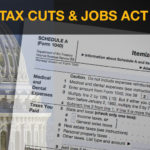
The Big Reveal: ALEC First Look at the Tax Bill
The House Ways and Means Committee released the much-anticipated tax reform legislation that preserves much of the original intent of lowering rates, simplifying the code and making it fairer. “ALEC…
-
State and Local Legislators Urge Congress to Eliminate State and Local Tax Deduction in Exchange for Pro-Growth Lower Rates
"Eliminating the state and local tax (SALT) deduction would provide upwards of $1.5 trillion over the next decade to implement broad-based tax cuts nationally. This overhaul would spur the growth in economic output needed to jolt business investment, personal income growth, and job growth."
-
ALEC Applauds Federal Tax Reform Framework
As a nation, we have fallen behind in competitiveness – just by standing still. As the rest of the world has reduced taxes on employers, our job creators pay some…
-
New Report Analyzes Governors’ Economic Policy Proposals
FOR IMMEDIATE RELEASE Contact: Taylor McCarty tmccarty@alec.org 734-752-5646 New Report Analyzes Governors’ Economic Policy Proposals State of the State addresses reveal free market…
-
Annual Report Highlights Nine States That Cut Taxes in 2016
For Immediate Release Contact: Taylor McCarty tmccarty@alec.org 202-309-1274 Arlington, VA (March 1, 2017)—Nine states substantially cut taxes in the 2016 legislative session, according to a…
-

2016 State Economic Competitiveness Index Reveals National Pro-Growth Trend
North Carolina, North Dakota, Wyoming and Arizona among top states; New York, Vermont, New Jersey, Connecticut and California rank last
-
New Report Highlights 17 States That Cut Taxes in 2015
Seventeen states cut taxes in the 2015 legislative year, matching a high-water mark that was first reached in 2013, according to a new report by the Center for State Fiscal Reform at the American Legislative Exchange Council (ALEC).
-
NFIB: Report Confirms 2012 Tax Cuts Put Kansas Back on Track
TOPEKA, Jan. 21, 2016–Dan Murray, state director of the National Federation of Independent Business, released the following statement today in response to strong showing by Kansas in the 8th edition…


